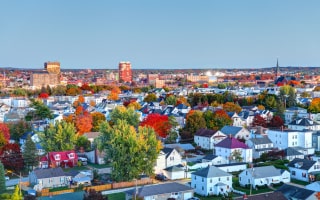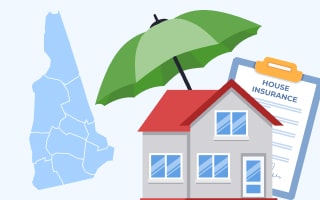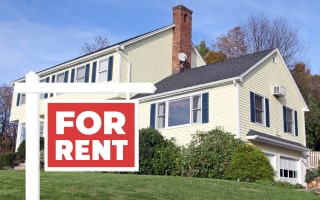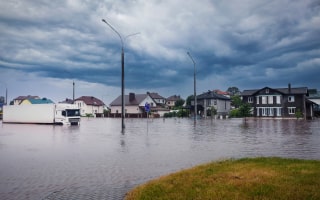Homeowners Insurance in New Hampshire

New Hampshire is known for the majestic beauty of its white mountains, plentiful rivers, lakes, and coastline. However, located in the northeast, the state also has frequent and harsh winter storms, floods, and hurricanes. Although New Hampshire is known as a relatively safe state when it comes to natural disasters, it does have its share of hail and windstorms throughout the year. Since 1953, New Hampshire has had 49 federally declared disasters, and the rate of disasters per 1 million people is 34.87.
In addition to wind, ice, and snow damage, New Hampshire residents also file claims for frozen/burst pipes and water damage, fires, liability issues, other structures, fallen tree damage, theft, and vandalism.
Although states don't require homeowners to buy any homeowners insurance, industry experts urge every property owner in New Hampshire must have at least some coverage. If you borrow money to buy a home in New Hampshire state, your lender/bank will require that you purchase and keep home insurance active on the property until the loan is paid off.
As of September 2024, the national average rate of homeowners insurance is $2,728 per year. New Hampshire residents pay an average of $958 a year for home insurance, which is considerably lower than most states.
Types of Homeowner Insurance Coverage Available in New Hampshire
Insurance providers choose which states to operate in based on the expected perils. These carriers offer various plans to homeowners to protect their homes in the event of a disaster. The available coverage types in New Hampshire include:
-
Dwelling Coverage: Dwelling coverage protects the structure of your home (roof, foundation, walls, wiring, plumbing, etc.) and pays to repair or replace your home after a disaster.
-
Personal Property Coverage: Personal property coverage protects your belongings and pays to replace them if stolen or destroyed in a covered peril.
-
Other Structures Coverage: Other structures coverage protects your detached structures (pools, fences, garages, sheds, hot tubs, etc.) and pays to replace them after a qualifying event.
-
Liability Coverage: If someone gets hurt on your property and then sues you, your liability coverage will pay your legal fees up to a limit.
-
Medical Payments: Medical payments coverage pays a victim's medical bills if they are hurt on your property.
-
Additional Living Expenses (ALE): If you must leave your home while it is repaired or rebuilt, ALE insurance pays for your food, lodging, pet boarding, furniture rental, etc., expenses.
You can also purchase an umbrella policy in New Hampshire to fill any gaps in your coverage. Since much of the Granite State is coastline, you might also consider a flood policy.
FEMA (Federal Emergency Management Agency) manages the National Flood Insurance Program (NFIP) through a network of 50 providers across the U.S.
Since most homeowners insurance does not cover floods, this supplemental coverage can repair damage and replace items after a flood. Depending on the options you choose, it can cover the building and/or your personal belongings. This program is available to homeowners, renters, and businesses. Learn more about the program on FEMA's website.
Home Insurance and Natural Disasters
Frequent storms and other natural disasters are the leading cause of stress for homeowners insurance providers. Global warming has changed our climate, and historically, areas with mild weather are now experiencing more violent weather events, driving insurance rates through the roof. Rates have spiked over the past five years to an average of 34% and, in some locations, as high as 60%. New Hampshire homeowners have seen a rate hike of only 17.9%.
New Hampshire has many heavy winter storms, some hurricanes, flooding, and a rare tornado here or there. All of which can cause devasting damage to a house. The average cost of just one water or ice damage claim is $11,650. Wind and hailstorms cost insurers an average of $11,695 per incident. In 2023, New Hampshire had two tornadoes thankfully, no one was killed. In 2022, the state had 103 wildfires destroying 381 acres of land. From 1980 to 2024, New Hampshire had only 21 billion-dollar disasters. Insurance providers suffered total losses of $182,150,400 from 2015 to 2019.
How Can I Save on Homeowner Insurance Premiums in New Hampshire?
Although home insurance premiums in New Hampshire are relatively low, you can always find ways to save. Some of the key issues that impact home insurance costs include:
-
Your Location: Your location is the most influential factor determining your insurance rates. If you live in an area with many natural disasters or high crime, you will pay more than if you live in a safe area with mild weather.
-
Age and Size of Your Home: The age and size of your home also matter. The larger the house, the higher your insurance rates. Newer homes cost far less to insure than older homes.
-
Condition of the House: Homes in good condition cost far less to insure than those in disrepair.
-
Your Deductible: The higher your deductible, the lower your rates. Conversely, the lower your deductible, the higher your rates.
-
Credit Score: Your credit also factors in. People with good credit scores earn lower rates than those with low scores.
-
Claims History: If you have a history of filing claims, your rates will be higher, as the insurance company will consider you a high risk.
-
Owned vs. Financed: If you own your home, you can choose your coverage limits. If you finance your house, your lender will decide for you.
-
Levels of Coverage: The more coverage you choose, the higher your premiums will be.
-
Cost of Materials/Labor: As construction materials and labor expenses rise, insurance rates must increase to accommodate the higher home rebuilding cost.
-
Risk Factors: If you have dangerous pets, a trampoline, pool, or hot tub, your rates will be higher than if you don't.
Some ways to save on your New Hampshire homeowners insurance include:
- Shop Around: When deciding which carrier to choose, ask for recommendations from family and friends and get multiple quotes. Balance the best coverage with the best price.
- Raise Your Deductible: Raise your deductible as high as possible to get lower rates.
- Bundle Policies: Bundle your policies with the same provider to earn extra rate discounts.
- Make Your Home Disaster-Resistant: Reinforce your roof, siding, shutters, and other elements to strengthen your house against perils. Inform your carrier, and they will adjust your rates.
- Ask for Discounts: Ask your insurance agent for any discounts you might be eligible for.
- Install Home Security: Install a sound home security system and earn lower rates because of it.
- Avoid Risks: Avoid risks and don't add any "attractive nuisances".
- Improve Your Credit: Improve your credit and ask your agent to reevaluate your rates.
- Don't File Small Claims: Avoid filing claims for small stuff. Wait until you really need it to keep your rates affordable.
Home Insurance Discounts in New Hampshire
Home insurance protects your home against covered perils. You purchase a policy with specific limits. If your house is destroyed or damaged by a qualifying event, the insurance company pays to repair or rebuild your home and replace your personal belongings. Most policies also include other structures, liability, medical payments, and ALE coverage.
You can quickly get a policy by choosing an insurance provider and contacting them through their website or by calling their 800 number. You can also find a good local agent to help you apply and determine the best coverage for your situation. The key is you must pay the first year in advance; depending on whether your house is financed, you can pay monthly through your mortgage escrow or once a year.
Some of the most common home insurance discounts offered by firms are:
- Claims-Free Discount: Keep your claims history clean, and your insurance provider will discount you.
- Senior Discount: Many insurance carriers give you a senior discount when you reach a certain age.
- Non-smoker Discount: Non-smokers earn an automatic discount from insurers because their fire risk is lower.
- Safety Discounts: If you add safety features to your home, like sprinklers, smoke alarms, and fire extinguishers, your provider may offer a discount.
- New Roof Discount: Adding a new roof could help keep your house from being destroyed and your claims history clean. As a result, your insurance provider will discount you.
- Early Quote Discount: Ask for a quote well before you need it and receive a discount.
- Bundling Discount: Most providers discount customers who bundle multiple policies together with them.
- Paperless Discount: Go paperless; you will help the environment and earn a discount on your home insurance.
- Autopay Discount: Sign up for autopayments, and your insurer will give you a small discount.
- New Home Discount: New homes cost up to 40% less to insure. Homes five years old or younger earn discounts of 26%.
- Military Discount: Military personnel (active or veterans) get discounts on home insurance.
- Employee Discount: Government employees, teachers, and firefighters often get discounts because of their profession.
- Smart Home Discounts: Install smart home devices to help keep your home safe and monitor for potential disasters. Your carrier could also discount your rates.
Common Rates Offer by Homeowners Insurance Firms
New homes cost far less to insure than older homes. In some cases, homeowners could pay as much as 40% less. Homes only five years old could cost 26% less to insure. New construction homeowners in New Hampshire spend an average of $590 annually on home insurance. However, your actual price will depend on many factors, like your age, the size of the home, your credit score, claims, history, and more.
Top 10 Home Insurance Firms in New Hampshire and Average New Home Savings
| Company | % savings |
|---|---|
| Amica | N/A |
| Nationwide | 76% |
| State Farm | 51% |
| Allstate | 47% |
| Travelers | 63% |
| USAA | 54% |
| Chubb | N/A |
| Liberty Mutual | N/A |
| Vermont Mutual | N/A |
| The Hanover Insurance Group | N/A |
Home Insurance and Renovations in New Hampshire

Home renovations will beautify your home and make it more livable, but they can also dramatically impact your home insurance rates. Some updates add space and value but will increase your rates because the home is larger. Other upgrades add risk and may also increase your rates. Some may lower your risk and rates while some may do both at the same time, unaffecting your premiums at all.
![]() Home Renovations that Increase Rates
Home Renovations that Increase Rates
Some home renovations that increase your rates include:
- Install a Pool or Hot Tub: Although hot tubs and pools are lots of fun, insurance companies consider them "attractive nuisances", and your rates will increase if you add one.
- Adding a Home Office: Adding more space to work at home can help your work/life balance. However, adding a home office will also add more value to the house, increasing your rates. Plus, some items like office equipment may need their own policy.
- Luxury Appliances/Fixtures: Adding luxury appliances and light fixtures can make your home sparkle, but they also cost more to replace and will add to your premiums.
![]() Home Renovations that Decrease Rates
Home Renovations that Decrease Rates
Some home renovations that decrease your rates include:
- Add Security or Sprinklers: Adding fire safety features like sprinklers or some security to keep your house safer will help decrease your home insurance rates.
- New Roof: Installing a stronger roof that can withstand storms will make your insurance company happy and lower your rates.
- Upgraded Plumbing: Upgrading your plumbing could help prevent leaks, water damage, and claims. Your insurer will decrease your rates after the update.
Upgrading your roof may save you big money on your insurance rates unless you choose an expensive material like metal or copper. Then your rates may go up.
When you choose to upgrade your home, those are not covered by homeowners insurance, even if they are to repair or maintain the house. Home insurance only pays to repair or replace your house after a qualifying event. Other things that homeowners insurance does not cover are pest infestations, rodents, or animal damage.
Before starting home renovations, always speak with your insurance agent to discuss how they may impact your rates and coverage. Your agent may need to visit the home after completion to review the work and adjust your coverage.
New Hampshire Renters' Insurance

People who rent homes (apartments, condos, and houses) also need homeowners insurance, but a different kind. Renters insurance is special insurance for renters and aims to protect your personal property. It does not include any dwelling coverage for the structure of the home. That is covered under the owner's policy (if they have one). The primary goal of renters insurance is to protect your belongings. Most policies also include liability coverage, medical payments, and loss of use. All policies have limits, and some expensive items like jewelry, furs, cars, and artwork may not be covered.
The three main items used by insurers to price renters insurance include:
-
Location: If you live in a city with higher crime or an area with a severe threat of disasters, you will pay more than if you live in the suburbs or a mild-weather area.
-
Coverage Limits: The more coverage you choose, the higher your rates will be—balance coverage limits with cost.
-
Number of Units: The higher the number of units in your building, the lower your rates will be.
Renters in New Hampshire pay an average of $155 per year or $13 a month for $40,000 of personal property coverage, $100,000 of liability, and a $1,000 deductible. That is very low, but not the lowest in the country. The national average is $15-$20 per month.
Condo Insurance in New Hampshire

Condo owners also need homeowners insurance. Condo insurance, or HO-6, is home insurance explicitly made for condo owners. It's different than homeowners insurance. The difference is that each condo association has its own "master policy" that covers the dwelling portion and will replace each building if destroyed by a covered event. The problem is the master policy will only restore the condo to its original condition (when first built), and that may be very outdated. Most condo owners have long since upgraded their kitchens, baths, flooring, appliances, and fixtures. That is where condo insurance comes in. It replaces all the interior items back to their most recent condition. Condo insurance also includes personal property protection, liability, medical payments, loss of use, and loss assessment.
Unlike renters insurance, which has no dwelling coverage, condo insurance does, but it only covers "walls-in", meaning the interior. Plus, the liability portion only covers someone if they are injured inside the condo, not outside or on common grounds.
Condo insurance pays to replace belongings and the interior of a condo after a qualifying peril like fire, smoke damage, windstorm, water damage, and theft or vandalism. Some of the items covered are:
- Furniture
- Appliances
- Interior Walls
- Flooring
- Electrical
- Plumbing
- Light Fixtures
- Countertops
- Cabinets
- Personal Belongings
The average cost of condo insurance in New Hampshire is $502/year or $42/month for $60,000 of personal property coverage and $300,000 of liability with a $1,000 deductible. That is slightly more than the national average of $455/year.
Some ways to save on condo insurance in New Hampshire include:
- Shop Around for Rates
- Raise Your Deductible
- Bundle Policies
- Fix Your Credit
- Don't File Small Claims
- Install Home Security
- Beef Up Fire Safety
- Ask for Discounts
New Hampshire Home Insurance Market
Unlike most insurance providers, those operating in New Hampshire have remained profitable for the past ten years. However, those profits are quickly declining as more frequent natural disasters hit the northeast. If this trend continues, and it is likely to do so, some providers will start to experience big losses and may need to limit coverage and cancel certain high-risk customers to recoup.
Frequent and harsh winter storms bringing ice, heavy snow, and wind can easily damage property. Hurricanes, floods, and other types of windstorms also threaten New Hampshire homes. As these events continue, the insurance industry suffers. Eventually, some carriers may pull out of the state altogether, slimming competition and making it more difficult for residents to find coverage.
Although no federal agency regulates the home insurance industry, states do. Each state designates an agency to monitor providers and rates, ensuring fairness and legality. The agency also investigates customer complaints and sanctions guilty firms. That agency in New Hampshire is the Department of Insurance, located at 56 Old Suncook Road, Concord, NH 03301.
Homeowners Insurance Guide
- Homeowners Insurance in New Hampshire
- Types of Homeowner Insurance Coverage Available in New Hampshire
- Home Insurance and Natural Disasters
- How Can I Save on Homeowner Insurance Premiums in New Hampshire?
- Home Insurance Discounts in New Hampshire
- Home Insurance and Renovations in New Hampshire
- New Hampshire Renters' Insurance
- Condo Insurance in New Hampshire
- New Hampshire Home Insurance Market
Instant Access to New Hampshire Property Records
- Owner(s)
- Deed Records
- Loans & Liens
- Values
- Taxes
- Building Permits
- Purchase History
- Property Details
- And More!
Homeowners Insurance Guide
- Homeowners Insurance in New Hampshire
- Types of Homeowner Insurance Coverage Available in New Hampshire
- Home Insurance and Natural Disasters
- How Can I Save on Homeowner Insurance Premiums in New Hampshire?
- Home Insurance Discounts in New Hampshire
- Home Insurance and Renovations in New Hampshire
- New Hampshire Renters' Insurance
- Condo Insurance in New Hampshire
- New Hampshire Home Insurance Market